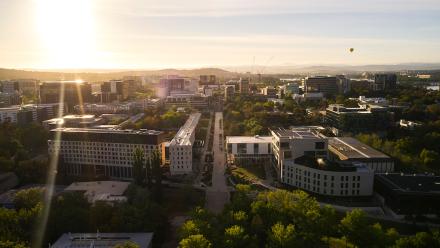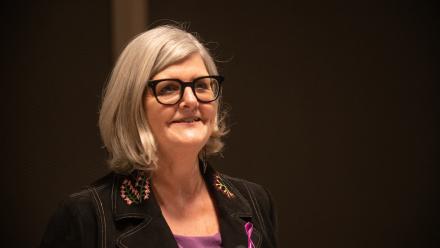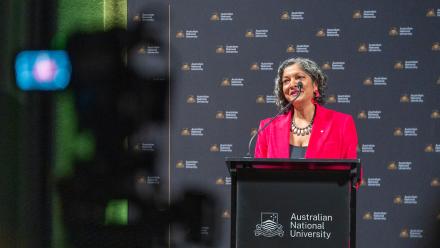C Moore BSc ‘15
As a queer and chronically ill person, I found myself advocating quite often for LGBTQIA+ and disabled students and that quickly became my passion.
Article written by Josephine Janssen (B Bus Admin, BA'17), from the ANU Women's Alumni Network.
C Moore has two great passions, science and advocacy, and has managed to combine the two into a values-based purpose. As a gender queer and disabled person, C understands the importance and impact of equal, fair and accessible policies and programs. They have therefore dedicated their life to advocating for human rights and social justice.
C graduated from ANU with a Bachelor of Science in 2015. They majored in Biology, minored in Biological Anthropology and specialised in Microbiology and Immunology. However, their passion for all things science began well before this. In 2011 and 2012, whilst at Canberra College, C was able to enrol into an ANU secondary college course in conservation biology. They also attended the National Youth Science Forum at ANU whereby they were able to partake in scientific research in the real world, exploring Mulligans Flat and Mulloon Creek to catch invertebrates and learn about sustainable farming. "It gave me a taste of what studying at ANU would be like and I found I really loved it," said C.
When asked what the best thing about studying at the ANU was, C responded, "The variety - I got to do everything from lab work in chemistry, to a little programming in statistics, to dissecting roadkill for parasitology, to digging up a staged crime scene for forensic anthropology. I also loved being a part of the Cross-Disciplinary Student's Association (XSA) where I got to swap knowledge with friends from all over the university. We held lecture series and pop culture presentations related to our studies, like how different pathogens are depicted in zombie movies and the epidemiological theory behind that".
Although C was interested in broadening their horizon and soaking up as much varied knowledge as possible, their keen interest in the sciences continued to shape their path. C became increasingly concerned with epidemiology and the impact of climate change, inspiring them to continue their studies further with a Cert III and IV in Population Health at the Canberra Institute of Technology (CIT). During which time, C worked with the CIT Student Association as a student support officer, doing frontline and systemic advocacy for students. At this point, it became clear to C that due to their health, they would not be able to follow the path of academic science. Fortunately, C had simultaneously discovered their passion for supporting people who were most vulnerable.
"As a queer and chronically ill person, I found myself advocating quite often for LGBTQIA+ and disabled students and that quickly became my passion."
C was able to combine their interest in health with their work in advocacy. "Since March 2018, I have been the Chief Executive Officer of Women with Disabilities ACT (WWDACT), where I've been advocating for the human rights of women, girls, non-binary and feminine identifying people in the ACT," said C.
"I'm also currently the administrator of the Canberra Queer and Disabled Network, where I'm seeking to make space for LGBTQIA+ people with disabilities like myself, who deal with complex issues of discrimination and bias in our daily lives. I also sit on the ACT Government Disability Reference Group".
Since delving into the world of advocacy, C has been awarded the 2018 Chief Minister's Inclusion Award for Emerging Young Leader and was a 2019 Finalist for the Canberra Women in Business Mentor of the Year Award.
Despite their chronic illness, C has clearly already achieved multiple accomplishments. So how do they manage to do this?
"I can't do anything at half speed. However, due to my chronic illness, I've had to learn to prioritise myself to ensure that I am here and alive and able to contribute. I've needed to learn to accept that fact, so that I can still continue to help others."
Having said that, C admits the feeling of having to prove oneself - noting this is often even more so the case for those in the disabled community - can make one feel the pressure and often lead to burn out. This has led C to set solid boundaries with work to ensure they can continue their important work in advocacy.
In addition to creating boundaries, C emphasises the importance of not being afraid to ask for help and seek out mentors. "Advocacy can be really draining, particularly if you're fighting for human rights and values you hold close to your heart. Having a network of like-minded people around you is really important, and essential for you to refine your ideas and skills in the field," said C.
As someone who has spent much of their adult life advocating for minority and vulnerable groups, C has come up against many obstacles and when asked what they think the biggest hurdle for women is, they note, "we're minorities not properly represented in the halls of power and it shows in policy. Even when a party might get 50% representation, it's all older, privileged white women. We need diverse experiences in the halls of power so that marginalised people are making the decisions, not begging for change from the outside. Real gender equality is inextricably tied to equality for disabled people, LGBTQIA+ people, people of colour and Aboriginal and Torres Strait Islander people, because without their involvement, privileged women simply become the oppressors, not equals."
So what needs to occur to reach equality? C says, "The best thing women in power can do is raise awareness and mentor fellow colleagues, as well as plan for a diverse succession. But no matter the minority you are advocating for, we all need to take a 'step up'". In this case, C suggests that stepping up entails looking at the issues at the highest level. After all, women's rights, racial equality, LGBTQIA* equality and accessibility for all are all at their core, human rights issues. They all suffer under the oppression of the patriarchy and from centuries of colonisation, as C puts it. C therefore recommends that we must band together and address these causes as human rights issues, if we want to succeed at making the world an equal and just place.


